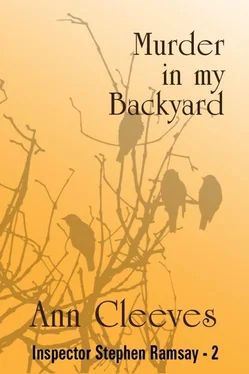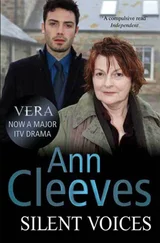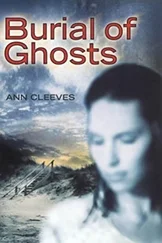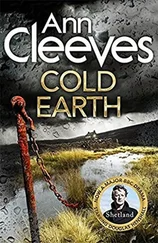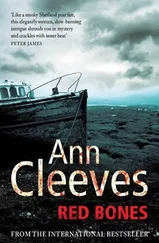Ann Cleeves - Murder in My Backyard
Здесь есть возможность читать онлайн «Ann Cleeves - Murder in My Backyard» весь текст электронной книги совершенно бесплатно (целиком полную версию без сокращений). В некоторых случаях можно слушать аудио, скачать через торрент в формате fb2 и присутствует краткое содержание. Жанр: Детектив, на английском языке. Описание произведения, (предисловие) а так же отзывы посетителей доступны на портале библиотеки ЛибКат.
- Название:Murder in My Backyard
- Автор:
- Жанр:
- Год:неизвестен
- ISBN:нет данных
- Рейтинг книги:5 / 5. Голосов: 1
-
Избранное:Добавить в избранное
- Отзывы:
-
Ваша оценка:
- 100
- 1
- 2
- 3
- 4
- 5
Murder in My Backyard: краткое содержание, описание и аннотация
Предлагаем к чтению аннотацию, описание, краткое содержание или предисловие (зависит от того, что написал сам автор книги «Murder in My Backyard»). Если вы не нашли необходимую информацию о книге — напишите в комментариях, мы постараемся отыскать её.
Murder in My Backyard — читать онлайн бесплатно полную книгу (весь текст) целиком
Ниже представлен текст книги, разбитый по страницам. Система сохранения места последней прочитанной страницы, позволяет с удобством читать онлайн бесплатно книгу «Murder in My Backyard», без необходимости каждый раз заново искать на чём Вы остановились. Поставьте закладку, и сможете в любой момент перейти на страницу, на которой закончили чтение.
Интервал:
Закладка:
“Will you have a drink, Inspector?” Stella asked. “ It’s so cold. You must have a drink.”
Ramsay said he would have a small one to keep out the cold. Stella returned to her chair with a drink for herself, and as she talked she twisted the stem of her glass between her fingers.
“This is all so upsetting,” she said. “ You can’t imagine how upset we are.”
Ramsay made no reply.
“How can we help you, Inspector?” James said.
“Just a few questions,” Ramsay said. “And I wanted to keep you in touch with what’s been going on. I’ve just come from your brother’s house.”
He paused, expecting some questions about how Max and Judy were, but James said nothing.
“They seem upset, too,” Ramsay said. “ I understand Judy and Mrs. Parry were very close. They shared a lot of interests.”
But again, if he hoped to provoke a response from the Laidlaws, he was disappointed. Stella seemed about to speak, but James looked at her and she remained silent.
“I’ve been trying to get in touch with Mary Raven, your reporter,” Ramsay said. “She wasn’t at home yesterday. Do you know where she is? I phoned the paper earlier, but no-one had seen her.”
“She was working in the magistrates court this morning,” James said. “I usually cover it, but Alice’s death made me forget all about it. She’ll be in the office tomorrow, I expect, if you want to talk to her, though I’m not sure if she’ll be able to help you.”
That came as something of a relief to Ramsay. One disappearing witness was quite enough.
“We have a little more information about Mrs. Parry,” he said. “She left Henshaw’s quite safely and arrived home at midnight.”
“We were both in bed by midnight,” Stella said quickly. “Weren’t we, darling? I was fast asleep. I always sleep so much better at Brinkbonnie than I do here.”
“I was certainly in bed,” James said, “though I was probably still reading then.”
“You didn’t hear anything?”
“Nothing.”
“Where was your room?”
“In the northwest corner of the Tower.”
“So you would have had a view of the churchyard and the drive?”
“I suppose so. Yes. But I didn’t look out.”
“What about you, Mrs. Laidlaw? Did you see anyone around the Tower or in the churchyard?”
She smiled a wide, feline smile. “No,” she said. “I didn’t see anything.” She almost purred with satisfaction, stretched, and settled again into the chair.
“Surely the most important thing,” James said, brusque and businesslike, “is to find out who wrote that anonymous letter.”
“Oh,” Ramsay said. “We know that. It was Charlie Elliot.”
“He’s your man then.”
“Perhaps. We need to talk to him certainly.”
“You mean you’ve let him go!”
Ramsay felt a familiar irritation. “It’s important, you know, to keep an open mind,” he said mildly.
“All the same, there’ll be some serious questions about how this investigation’s been handled!”
There was the sound then of a car pulling up on the drive outside the house and the front doorbell rang. James seemed frustrated to be disturbed in the middle of his indignation. He shut the door behind him as he went out, but from the sitting room they heard raised voices, angry words. For a moment the other voice was vaguely familiar to Ramsay, but it subsided almost immediately and the impression was lost. The front door was opened and slammed shut and then the car drove away.
“Problems?” Ramsay asked when James returned to the room.
“Not really,” James said. “We printed an uncomplimentary story about a local businessman who’d been prosecuted by the health and safety executive. He wanted to complain. Said we were biased. It’s all nonsense, of course.”
“Do people often come to your house?”
“No,” James said shortly. “ It’s not something I encourage. It won’t happen again.”
They offered Ramsay another drink, but he refused and said he should go home. When he went outside, the air was milder and droplets of moisture hung in the air. All night there was the sound of melted snow dripping in the gutters, and in the morning the garden was green again and the sun was shining.
Chapter Thirteen
The car stolen by Charlie Elliot from Tom Kerr’s garage was found late on Monday evening in the car park of a Do-It-Yourself Superstore in the industrial estate just outside Otterbridge. No-one could remember how long it had been there. No-one had seen Charlie Elliot in the streets around the town, though a motorbike had been stolen from outside a house close to the estate and the police were working on the theory that he had taken it. His picture was on the front page of every local newspaper. The press had found an old army photograph with Charlie standing beside a friend, smiling, and because that did not look sufficiently sinister there was a police sketch, too, with staring eyes and stubble on his chin. It was evident from the pictures and from the tone of the newspapers’ reporting that Charlie Elliot was a murderer.
Ramsay was under increasing pressure to limit the scope of his investigation to the arrest of Charlie Elliot. Early on Tuesday morning the superintendent had Ramsay in his office.
“Look,” he said. “ Steve.”
Ramsay winced.
“I respect your integrity, but I think you’re being unnecessarily cautious here. We have motive. We have opportunity. The chap’s run away. That’s almost as good as a confession. We really can’t justify the time and cost of any wider investigation. It’s a matter of following up sightings until he’s caught. It’s all a question of publicity now. He’ll be miles away. You’re a good man. We must think about your career. After that unfortunate business at Heppleburn you should keep your head down for a while. Avoid controversy. Steve, I’m thinking of your future.”
“I don’t think he did it,” Ramsay said. “ I believed him. There was a woman in the churchyard.”
“Find me the woman and we might have a different situation.”
“Look,” Ramsay said. “I’m investigating a different angle on the development. Henshaw’s got no record, but apparently he’s been known to use violence to get what he wants. He’s not the respectable builder he likes to be thought of. I want to follow that up, too. But I need time. And men.”
“Steve. Leave it alone. I’m sorry. This is an order. It’s a matter of economics. If we had unlimited resources…”
“Two more days,” Ramsay said. “ Give me two more days. Me and Hunter.”
“You think you can wrap it up in two days?”
“I’ll have to,” Ramsay said. “Won’t I?”
The superintendent nodded.
In the Incident Room Hunter was on the telephone. Calls were coming in from all over the country. Elliot had been seen on a train between Cardiff and Swansea, hitching a lift down the M1, in a bus queue in south London.
“Fantasies!” Ramsay said, when Hunter showed him the reports. “Nothing worth bothering about there.”
He dialled Jack Robson’s home number, but though he let it ring there was no reply. The lack of response made him irrationally angry.
“Come on,” he said to Hunter. “ You can’t stay in here drinking tea all day. There’s too much work to do. We’re going to talk to Mary Raven.”
Mary Raven slept badly, and while it was still dark she got up and wandered about the flat drinking mug after mug of black coffee, trying to decide what she should do about Max. The sensible thing would be to stop the affair now. It had caused enough hurt. He had treated her abominably and had appeared at the flat the night before because he wanted reassurance and information. She was a fool to think he would leave his wife and his precious family for her. He did not care that much. Then the romantic excitement of his appearance at the flat, uninvited, shy, moved her almost to tears. She knew it was unreasonable to expect him to leave his wife, but she had never been one for logical thought.
Читать дальшеИнтервал:
Закладка:
Похожие книги на «Murder in My Backyard»
Представляем Вашему вниманию похожие книги на «Murder in My Backyard» списком для выбора. Мы отобрали схожую по названию и смыслу литературу в надежде предоставить читателям больше вариантов отыскать новые, интересные, ещё непрочитанные произведения.
Обсуждение, отзывы о книге «Murder in My Backyard» и просто собственные мнения читателей. Оставьте ваши комментарии, напишите, что Вы думаете о произведении, его смысле или главных героях. Укажите что конкретно понравилось, а что нет, и почему Вы так считаете.
